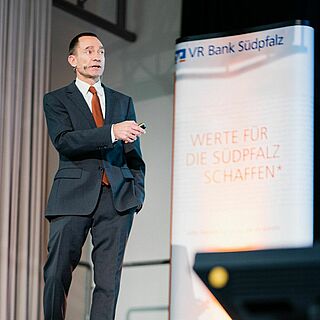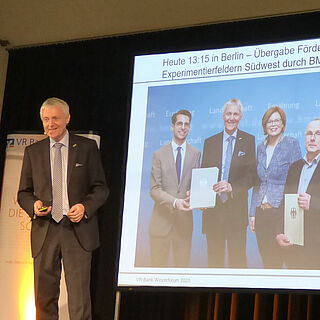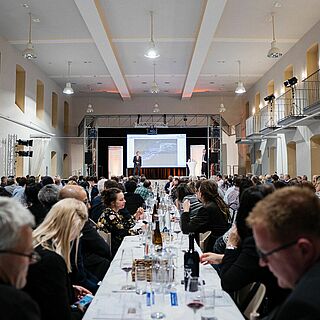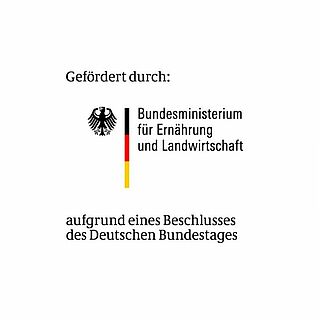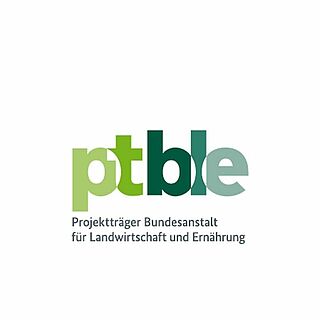Wine Campus Neustadt involved in three projects at Digital Experimentation Field Southwest
Wine Campus Neustadt is involved in three projects in the Digital Experimentation Field Southwest
- Agriculture and special crops develop comprehensive digital solutions
Industry and agriculture have already largely implemented digitalization to increase efficiency and optimize performance. Digitalization can also offer potential solutions for viticulture if the operational requirements are taken into account and the digital infrastructure is tailored to suit. The Digital Experimentation Field Southwest in Rhineland-Palatinate is working on this and developing a cross-sector and cross-company data management system. Of a total of nine digitization projects, three are being implemented at the Wine Campus Neustadt.
1. electronic documentation and management of production data along the value chain of agricultural products using the example of wine production
Farms are subject to extensive bureaucratic obligations, such as keeping cellar, wine or material books. Furthermore, various reporting obligations must be complied with during production, processing and marketing. In the experimental field "Electronic documentation and management of production data along the value chain of agricultural products using the example of wine production", for which Prof. Ulrich Fischer from the Wine Campus Neustadt is responsible, the focus is on relieving farms of the burden of this bureaucracy. To this end, a digital documentation system is being set up through which wine producers can send their data electronically. Wine laboratories, authorities or the Chamber of Agriculture use the digital system to fulfill their documentation obligations, but also send back laboratory data in this way. In future, the winery will create and send the obligatory grape and wine harvest report from the cellar book data at the touch of a button, as well as applications for quality wine testing. The accompanying documents previously required in quintuplicate are now generated digitally and can be accessed at any time when wines, grapes or musts are transported and inspected within Germany or Europe.
2. smart data management of logistics chains in agriculture using the example of grape logistics
The experimental field "Smart data management of logistics chains in agriculture using the example of grape logistics" uses design science to investigate the potential for business optimization through digital solutions and data management in the logistics processes of the wine industry. The optimization of logistics chains has revolutionized parts of the economy and led to completely new business models. Logistics is recognized as a driver of innovation for Germany, and optimization also ensures product quality in agricultural value creation systems. Logistics optimization also makes a significant contribution to the urgently needed increase in economic efficiency and sustainability. In this part of the project, which is led by Prof. Marc Dreßler from the Wine Campus Neustadt, the logistics processes in wineries are surveyed with practice partners, associated data management is recorded, digital solution approaches are evaluated, optimization potentials are identified via simulations and optimized processes are created and tested. Practical and relevant results are ensured through integrative research with practitioners.
3. digitally supported energy monitoring and energy management systems in vineyards and wineries
In addition to the direct energy cost issue, the trade also demands greater transparency in the use of resources. The aim of the project is to be able to better evaluate products in terms of pricing and placement with regard to sustainability targets. The wine value chain, which is divided into sections, makes it difficult to manage resource-related data. Wine-growing processes are highly isolated from each other due to seasonal factors and result in high standby losses. A standardized energy monitoring and energy management system for wineries currently fails due to discontinuous process management and a lack of accessibility to process-related energy data and to process data itself. This is where Prof. Dominik Durner's project from Wine Campus Neustadt comes in. The concept includes the hardware for energy measurement, a data transmission structure and open source programming with input options for process and product specifications by the user and several visualization levels for individual processes, overall operational processes, actual and target states.
The overall package of the Experimental Fields Southwest, consisting of application-oriented research, coaching and implementation in practice, is put together by the practice-oriented Rural Area Service Centers (Rheinhessen-Nahe-Hunsrück, Eifel, Westerwald-Osteifel, Rheinpfalz), universities (TH Bingen, TU Kaiserslautern, Wine Campus Neustadt) and non-university research institutions (Rural Area Service Center (DLR) Rhenish Palatinate, RLP-AgroScience, LVAV Neumühle). The starting signal for the Southwest Experimental Field was given by Federal Minister of Agriculture Julia Klöckner on March 9, 2020 in Berlin, when she handed over the funding decisions for 4.35 million euros to the project managers.


